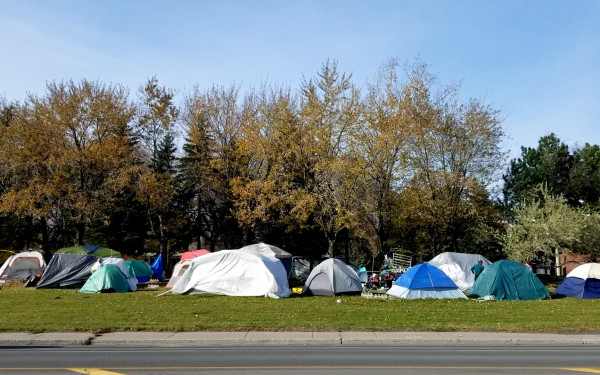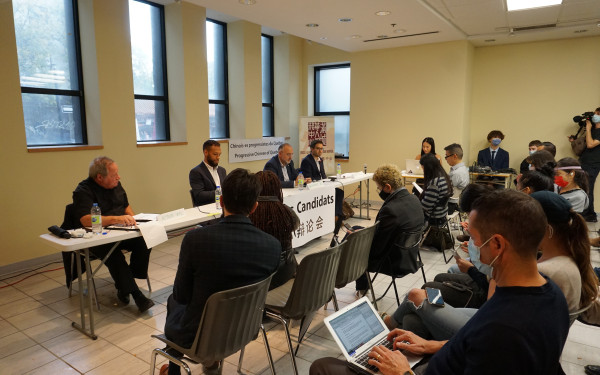Night of the Homeless Holds 28th Solidarity March
Équipe Denis Coderre pour Montréal, Projet Montréal, and Québec Solidaire Show Support
A group of about 300 people marched from Square Phillips to Square Cabot in solidarity with Montreal’s homeless on Friday night.
The march serves to speak out against social profiling and spread awareness about the realities of homelessness. There were speakers addressing topics such as mental illness, dependency, and abuse as the crowd marched.
“There’s a rank housing problem in Quebec,” said attendee Gilbert Buri. “There’s nothing for Aboriginal people. There’s nothing except some shelters. It’s abhorrent because a lot of us will die. If we raise awareness, and listen to people a bit more, then maybe some can be saved.”
The crowd chanted slogans like, “We all have a role to play, which one?” Many held up signs with messages of solidarity such as “A roof is a right,” and “Homelessness in Montreal: There’s a lot left to do.”
Verdun city councillor for Projet Montréal, Sterling Downey, whose platform has a major focus on homelessness also attended the event.
“I think this event is really important in terms of sensitizing people to something that is sometimes hidden even though it’s right in front of our faces,” he said. “By coming to this, and taking the time to speak to people or see what’s going on you connect to it in a different way.”
3_900_729_90.jpg)
“These events are important, they create that platform for people to connect and understand what the needs and impacts of those decisions,” he said. “As an elected official it’s important to see and hear about the impact of the decisions I make and those I don’t make. It’s very humbling.”
“It’s up to all of us here to make a small difference,” said filmmaker Jean-Marie Lapointe. “A small difference is worth more than indifference.”
His documentary series Face à la rue explores the reasons people end up in the streets. He hopes to break down the prejudices people have on homelessness and offer help to those in need.
Organizations like Salvation Army and Dans La Rue were there to give out free food in the square. SOS Itinerant was giving out clothing, and Coiffeur de rue offered free haircuts.
Dans La Rue is a group that tries to offer services to people in the streets, mainly bringing food to kids in the east part of the island five nights a week. They also have a day center that offers counselling, job placement, help in finishing school, medical care, and access to veterinarians.
Attendee Francis Pothier thinks the event is nice but doesn’t believe that “being nice to homeless people for one day changes anything.”
“They call it ‘The Night of the Homeless’ but they have 364 other nights that they live homeless,” said Amir Khadir, a spokesperson for Québec Solidaire.
“Although we are a wealthy country, the policies are not tailored to be able to eradicate the problems of homelessness.” — Amir Khadir, Québec Solidaire
Mayoral Candidates Make an Appearance
Also at the vigil were Montreal Mayor, Denis Coderre, Projet Montréal candidate Valérie Plante, and the aforementioned, Khadir.
“It’s important to show our support and to come up with strong ideas on how to fight homelessness,” said Plante.
Earlier that day, Projet Montréal had presented their platform which include investing more money into affordable housing. They also want to spread the resources to other neighbourhoods instead of focusing only on the downtown area.
She added that Projet Montréal wants to work with the Montreal police in order to make sure that social profiling is taken into consideration, and to do follow-ups regarding the issue.
“It’s important to remind people that anyone can fall into a situation of homelessness,” said Plante.
Khadir said that though it’s important to walk for this issue, there are a lot of resources to address this problem in a more honorable manner. To him this means to give shelter and the possibility to rehabilitate to those who have mental health, physical, or dependency problems.
“Although we are a wealthy country, the policies are not tailored to be able to eradicate the problems of homelessness,” Khadir said.
Coderre, who has also participated in the march several times, said that homelessness is one of his priorities.
“We want to make sure we help those who are left behind and we want to help those who are most vulnerable,” he said.
Coderre added that his party implemented the supervised injection sites and created the position of protector of the homeless, held by Serge Lareault, to help the issue of homelessness.
4_900_884_90.jpg)
“With the status of metropolis, now we will have the full power in housing and we’ll be able to create more affordable housing to help [homeless people] out of that situation,” said Coderre.
He also wants to do more to prevent homelessness by taking better care of Montreal’s indigenous communities, students, and other vulnerable groups.
Independant candidate Bernie Gurberg, whose platform focuses entirely on reducing poverty in the city, couldn’t make an appearance as he was busy working at the Dollar Cinema.
“My focus is on lowering the 34 per cent (poverty rate),” Gurberg told The Link over the phone. “By focusing on that, it’ll fix the other problems, including homelessness.”
He said that he’s the only one running for mayor who is fighting poverty. He also expressed disgust that Montreal had a “billion-dollar birthday party” when so many are hungry.
“I’m one person,” he said. “I don’t have a party behind me. I’m doing it on my own, and can’t attend as much as they can.”
Gurberg claims that he’s going to fix the problem if he gets the seat by helping people find jobs, and providing funding to food banks.

1_900_600_90.jpg)
2_900_600_90.jpg)

1_600_375_90_s_c1.jpg)

